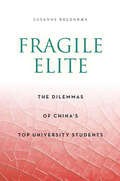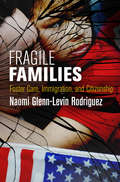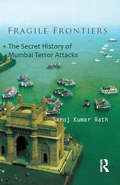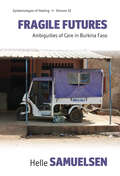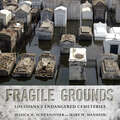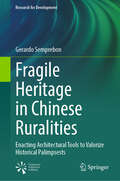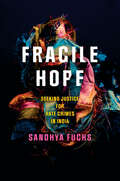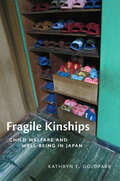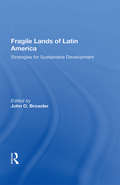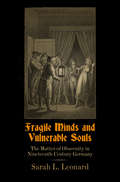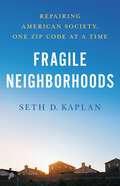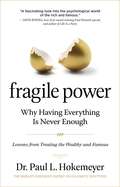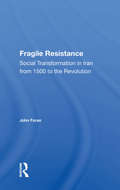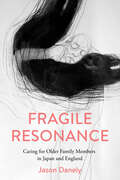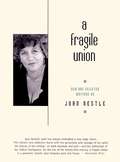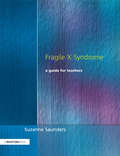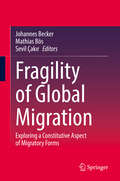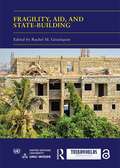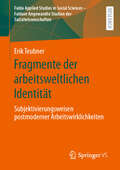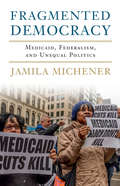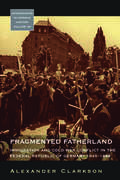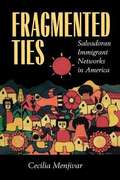- Table View
- List View
Fragile Elite: The Dilemmas of China's Top University Students
by Susanne BregnbækChina's One Child Policy and its rigorous national focus on educational testing are well known. But what happens to those "lucky" few at the very top of the pyramid: elite university students in China who grew up under the One Child Policy and now attend the nation's most prestigious universities? How do they feel about having made it to the top of an extremely competitive educational system—as their parents' only child? What pressures do they face, and how do they cope with the expectations associated with being the best? Fragile Elite explores the contradictions and perplexities of being an elite student through immersive ethnographic research conducted at two top universities in China. Susanne Bregnbæk uncovers the intimate psychological strains students suffer under the pressure imposed on them by parents and state, where the state acts as a parent and the parents reinforce the state. Fragile Elite offers fascinating insight into the intergenerational tensions at work in contemporary China and locates them within an ongoing shift in educational policy and what exactly it means to be a "quality" student, child, and citizen within Chinese society.
Fragile Families: Foster Care, Immigration, and Citizenship (Pennsylvania Studies in Human Rights)
by Naomi RodriguezIn the past decade, debates over immigrant rights and family rights, and accompanying concerns over birthright citizenship, have taken center stage in popular media and mainstream political debates. These debates, however, frequently overlook the role of the public child welfare system in the United States—the agency charged with protecting children and maintaining the integrity of families. <P><P> Based on research conducted in the San Diego-Tijuana region between 2008 and 2012, Fragile Families tells the stories of children, parents, social workers, and legal actors enmeshed in the child welfare system, and sheds light on the particular challenges faced by the children of detained and deported non-U.S. citizen parents who are simultaneously caught up in the immigration system in this border region. <P><P>Many families come into contact with child welfare services because of the precariousness of their lives—unsafe housing, unstable employment, and the conditions of violence, drug use, and domestic violence made visible by the heightened police presence in impoverished communities. Naomi Glenn-Levin Rodriguez examines the character of child welfare decision-making processes and how discretionary decisions constitute the central avenue through which race, citizenship, and other cultural processes inflect child welfare practice in a manner that disproportionately impacts Latina/o families—both undocumented and U.S. citizens. <P><P>Drawing on ethnographic fieldwork to look at how immigration enforcement and child welfare play central roles in the ongoing production of citizenship, race, and national belonging, Fragile Families focuses on the everyday experiences of Latina/o families whose lives are shaped at the nexus of child welfare services and immigration enforcement.
Fragile Frontiers: The Secret History of Mumbai Terror Attacks
by Saroj Kumar RathCritical questions remain unanswered on the events of the cold-blooded and devastating terror attacks in Mumbai on 26 November 2008. Investigative and introspective, this book offers a lucid and graphic account of the ill-fated day and traces the changing dynamics of terror in South Asia. Using new insights, it explores South Asia’s regional dynamics of antagonism, the ever-present challenge to the frontiers of India, Pakistan and the terrorism question, the strife in Afghanistan and the self-serving selective US ‘war on terror’. This will be an engaging read for those interested in defence, security and strategic studies, politics, international relations, peace and conflict studies, and South Asian studies as well as the general reader.
Fragile Futures: Ambiguities of Care in Burkina Faso (Epistemologies of Healing #22)
by Helle SamuelsenCaring for small children and the family in Burkina Faso is hard work. Although the health infrastructure in Burkina Faso is weak and many citizens feel neglected by the state, Fragile Futures shows that the state continues to play an important role in people’s engagements and hopes for a better future. Based on more than twenty years of research engagement with Burkina Faso, it is an ethnography of how rural citizens address ambiguities of sickness and care and try to secure a decent future for themselves and their families.
Fragile Grounds: Louisiana's Endangered Cemeteries (America's Third Coast Series)
by Mary H. Manhein Jessica H. SchexnayderRecipient of a 2018 Preserve Louisiana Award and a 2018 Coastal Stewardship AwardFragile Grounds compiles stories and photographs of endangered cemeteries throughout Louisiana's coastal zone and beyond. These burial places link the fragile land to the frailty of the state's threatened community structures. The book highlights the state's vibrant diversity by showing its unique burial customs and traditions, while it also identifies the urgent need for ongoing documentation of cultural elements at risk.Cemeteries associated with the culturally rich communities of Louisiana reflect the history and global settlement patterns of the state. Yet many are endangered due to recurring natural and man-made events. Nearly 80 percent of the nation's coastal land loss occurs in Louisiana. Coastal erosion, sinking land, flooding, storm surge, and sea-level rise have led to an inland migration that threatens to unravel the fabric of Louisiana and, by association, hastens the demise of its burial places.As people are forced inland, migrants abandon, neglect, or often overlook cemeteries as part of the cultural landscape. In terms of erosion, when the land goes, the cemetery goes with it. Cemeteries fall prey to inland and coastal flooding. As cities grow outward, urban sprawl takes over the landscape. Cemeteries lose out to forces such as expansion, eminent domain, and urban neglect. Not only do cemeteries give comfort for the living, but they also serve as a vital link to the past. Once lost, that past cannot be recovered.
Fragile Heritage in Chinese Ruralities: Enacting Architectural Tools to Valorize Historical Palimpsests (Research for Development)
by Gerardo SemprebonThis book explores the concept of fragile heritage as an architectural legacy and a territorial resource in rural China, emphasizing the significance in safeguarding its unique cultural trajectory, and laying the groundwork for future developments. Chinese rural buildings and settlements encapsulate priceless cultural values, but become increasingly vulnerable, under increasing pressures. Socioeconomic transitions, climate change, political agendas, land rent speculation, awakenings, and commodifications of cultural values, redefine the conceptual and operational framework of countryside transformation, and contribute to the debate on contemporary architectural and urban design. In this context, rural authenticity emerges as a crucial value in architectural morpho-typology, construction techniques, and expressive codes. The book introduces the notion of fragile heritage as the crossroad between folklore, academia, and practice. Next, it put in place reading methods to frame rural settlements as cultural palimpsests, indissolubly tying architectures to the landscape. These concepts are then applied to a multiscalar analysis of fifteen traditional architectures to uncover rural space and society's physical and cultural dimensions. Finally, it discusses recent revitalization projects, highlighting the potential role of architectural design. The research methodology relies on fieldwork campaigns in the Fujian and Zhejiang Provinces of China between 2017 and 2019 and a subsequent critical ri-elaboration that leverages the graphic apparatus as the fundamental investigative tool. The central idea put forward in this book is that, between tradition and innovation, the fragile heritage of past societies needs a cultural translation, interpretation, and negotiation to find space and life in the contemporary milieu.
Fragile Hope: Seeking Justice for Hate Crimes in India (South Asia in Motion)
by Sandhya FuchsAgainst the backdrop of the global Black Lives Matter movement, debates around the social impact of hate crime legislation have come to the political fore. In 2019, the UN Commission on Crime Prevention and Criminal Justice urgently asked how legal systems can counter bias and discrimination. In India, a nation with vast socio-cultural diversity, and a complex colonial past, questions about the relationship between law and histories of oppression have become particularly pressing. Recently, India has seen a rise in violence against Dalits (ex-untouchables) and other minorities. Consequently, an emerging "Dalit Lives Matter" movement has campaigned for the effective implementation of India's only hate crime law: the 1989 Scheduled Castes/Scheduled Tribes Prevention of Atrocities Act (PoA). Drawing on long-term fieldwork with Dalit survivors of caste atrocities, human rights NGOs, police, and judiciary, Sandhya Fuchs unveils how Dalit communities in the state of Rajasthan interpret and mobilize the PoA. Fuchs shows that the PoA has emerged as a project of legal meliorism: the idea that persistent and creative legal labor can gradually improve the oppressive conditions that characterize Dalit lives. Moving beyond statistics and judicial arguments, Fuchs uses the intimate lens of personal narratives to lay bare how legal processes converge and conflict with political and gendered concerns about justice for caste atrocities, creating new controversies, inequalities, and hopes.
Fragile Kinships: Child Welfare and Well-Being in Japan
by Kathryn E. GoldfarbIn Fragile Kinships, Kathryn E. Goldfarb shows how child welfare systems do not always generate well-being. This is true across the world, as it is in Japan. Policymakers, caregivers, and people with experience in state care endeavor to imagine—and implement—child welfare systems that are genuinely supportive. Yet despite these efforts, social welfare systems too often produce people who are alone. By centering relationality in theorizing social forms of care, Fragile Kinships offers key insights into embodied and socioemotional well-being. Goldfarb analyzes both the feelings and effects of lacking kin, and the transformative energy people invest in creating new forms of kinship and relatedness. Fragile Kinships demonstrates why welfare systems must support relational well-being. In her contributions to anthropological theories of kinship, embodiment, and the field of Japanese studies, Goldfarb also speaks to academics, practitioners, and policymakers in Japan and globally with ethnographically grounded perspectives suggesting ways that child welfare systems might truly achieve wellbeing.
Fragile Lands Of Latin America: Strategies For Sustainable Development
by John O. BrowderThis book of selected research papers, originally presented at the "Symposium of Fragile Lands of Latin America—The Search for Sustainable Uses," presents some fresh evidence of the viability of a few "non-conventional" strategies for natural resource development and management.
Fragile Migration Rights: Freedom of movement in post-Soviet Russia (Routledge Studies in Criminal Justice, Borders and Citizenship)
by Matthew LightThe Soviet Union comprehensively governed the mobility of its citizens by barring emigration and strictly regulating internal migration. In the aftermath of the Soviet collapse, the constitution and laws of the new Russian Federation appeared to herald a complete break with the repressiveness of the previous government. Russian law now proclaims the right of Russian citizens and residents to move around their country freely. This book examines how and why this post-Soviet legal promise of internal freedom of movement has been undermined in practice by both federal and regional policies. It thereby adds a new dimension to scholarly understanding of the nature of rights, citizenship, and law enforcement in contemporary Russia. Most contemporary works focus on the attempts of developed Northern countries to regulate migration from the global South to the global North: here Matthew Light examines the restriction of migration within Soviet and post-Soviet Russia, providing a comprehensive view into an area rarely explored within migration scholarship. Fragile Migration Rights develops a comprehensive theoretical framework to analyse this complex subject. It is essential reading for students and academics from a range of disciplines including criminology, human rights, migration studies, and political science.
Fragile Minds and Vulnerable Souls: The Matter of Obscenity in Nineteenth-Century Germany (Material Texts)
by Sarah L. LeonardFragile Minds and Vulnerable Souls investigates the creation of "obscene writings and images" as a category of print in nineteenth-century Germany. Sarah L. Leonard charts the process through which texts of many kinds—from popular medical works to stereoscope cards—were deemed dangerous to the intellectual and emotional lives of vulnerable consumers. She shows that these definitions often hinged as much on the content of texts as on their perceived capacity to distort the intellect and inflame the imagination.Leonard tracks the legal and mercantile channels through which sexually explicit material traveled as Prussian expansion opened new routes for the movement of culture and ideas. Official conceptions of obscenity were forged through a heterogeneous body of laws, police ordinances, and expert commentary. Many texts acquired the stigma of immorality because they served nonelite readers and passed through suspect spaces; books and pamphlets sold by peddlers or borrowed from fly-by-night lending libraries were deemed particularly dangerous. Early on, teachers and theologians warned against the effects of these materials on the mind and soul; in the latter half of the century, as the study of inner life was increasingly medicalized, physicians became the leading experts on the detrimental side effects of the obscene. In Fragile Minds and Vulnerable Souls, Leonard shows how distinctly German legal and medical traditions of theorizing obscenity gave rise to a new understanding about the mind and soul that endured into the next century.
Fragile Neighborhoods: Repairing American Society, One Zip Code at a Time
by Seth D. KaplanAn &“essential and engaging &” (Richard Florida) exploration of social decline in America: its true causes and the practical steps each of us can take to combat it, starting with the places we call home. The neighborhoods we live in impact our lives in so many ways: they determine who we know, what resources and opportunities we have access to, the quality of schools our kids go to, our sense of security and belonging, and even how long we live. Yet too many of us live in neighborhoods plagued by rising crime, school violence, family disintegration, addiction, alienation, and despair. Even the wealthiest neighborhoods are not immune; while poverty exacerbates these challenges, they exist in zip codes rich and poor, rural and urban, and everything in between. In Fragile Neighborhoods, fragile states expert Seth D. Kaplan offers a bold new vision for addressing social decline in America, one zip code at a time. By revitalizing our local institutions—and the social ties that knit them together—we can all turn our neighborhoods into places where people and families can thrive. Readers will meet the innovative individuals and organizations pioneering new approaches to everything from youth mentoring to affordable housing: people like Dreama, a former lawyer whose organization works with local leaders and educators in rural Appalachia to equip young people with the social support they need to succeed in school; and Chris, whose Detroit-based non-profit turns vacant school buildings into community resource hubs. Along the way, Kaplan offers a set of practical lessons to inspire similar work, reminding us that when change is hyperlocal, everyone has the opportunity to contribute.
Fragile Power: Why Having Everything Is Never Enough; Lessons from Treating the Wealthy and Famous
by Dr. Paul L. HokemeyerA revealing exploration of people whose wealth, fame, beauty, and social status grant them immense power. Celebrity culture drives us to aspire to be like the few who seem to have figured out how to have it all. But is it possible that they simultaneously have everything and nothing at all?Having treated some of the world’s most successful people, psychotherapist “Dr. Paul” sets out to answer why so many people who have everything end up feeling like their achievements are never enough—as well as what that pattern can reveal about ourselves and the society in which we live. The exclusivity of living behind the velvet rope or the gilded gate doesn’t guarantee happiness for the rich, famous, and powerful; there are downsides to attainment as well. We all—including people who seem protected by their privileged lives—can experience the self-destructive behaviors common to modern life, including chronic stress, addiction, anxiety, imposter syndrome, infidelity, negative body image, and narcissism. Division marks our era. There’s a growing separation between the haves and have nots, men and women, as well as the empowered and the disenfranchised. At the same time, our culture is defined by celebrities, and the powerful, affluent people we put on a pedestal to idolize and emulate. Too often, we think our lives would be better if we could have what they have or be more like them. It’s time to realize that even the most admired people can go through life feeling unloved and unable to escape their problems. From the therapist’s chair, we learn how feelings of shame, insecurity, abandonment, and emotional pain are all part of the human condition. With empathy, we can overcome our sense of isolation by realizing that we all crave—and deserve—understanding, intimacy, and real connection.
Fragile Resistance: Social Transformation In Iran From 1500 To The Revolution
by John ForanThis book analyzes the processes of social transformation in Iran from the height of the country's power in the sixteenth and seventeenth centuries under the Safavid dynasty to the aftermath of the startling revolution that overthrew the Pahlavi monarchy in 1979.
Fragile Resonance: Caring for Older Family Members in Japan and England
by Jason DanelyFragile Resonance describes the paths carers take as they make meaning of their experiences and find a sense of moral purpose to sustain them and guide their decisions. When a parent or partner becomes frail or disabled, often a family member assumes responsibility for their care. But family care is a physically and emotionally exhausting undertaking. Carers experience moments of profound connection as well as pain and grief. Carers ask themselves questions about the meaning of family, their entitlement to support, and their capacity to understand and sympathize with another person's pain. Based on his research gathering stories of family carers in Japan and England, Jason Danely traces how care transforms individual sensibilities and the roles of cultural narratives and imagination in shaping these transformations, which persist even after the care recipient has died. Throughout Fragile Resonance, Danely examines the implications of unpaid carer's experiences for challenging and enhancing social policies and institutions, highlighting innovative alternatives grounded in the practical ethics of care.
Fragile Union: New and Selected Writings
by Joan NestleA Fragile Union is Joan Nestle’s collection of intimate essays and narratives about lesbian sexuality, butch-femme relationships, sex writing, the importance of preserving lesbian and gay history, the love between lesbians and gay men, and the "often-shaky camaraderie among lesbians that as community continues to flex its diversity." Longtime readers of Nestle's writings are familiar with her themes of unity and difference. In A Fragile Union, Nestle delves still deeper. Living with cancer, Nestle explores other "fragile unions": the fragility of her sexual desire in the face of her illness, the fragility of memory in the face of loss, and always in the face of fear, her belief in the possibility of hope, her love for her people—women, lesbians and gays, working class, and all who struggle against injustice.
Fragile X Syndrome: A Guide for Teachers
by Suzanne SaundersFragile X Syndrome is thought to be the most common inherited cause of learning difficulties. However many people have never heard of it and those who have, including many of the professionals who work with those affected by it, have little knowledge or understanding of the condition. This book brings up to date research with information and advice from teachers who are discovering, first hand, the best ways of educating children with Fragile X. It is much needed support and advice that will help teachers to understand the child with Fragile X and encourage maximum educational progress. / While the book is aimed at teachers, it is also an excellent resource for parents, therapists and any professional working with a child who has Fragile X.
Fragility of Global Migration: Exploring a Constitutive Aspect of Migratory Forms
by Mathias Bös Johannes Becker Sevil ÇakırThis book demonstrates the analytical power of the concept of fragility as a central and defining aspect of global migration processes. To this end, the book brings together authors from the Americas, South Asia, the Middle East, and Europe, fostering a global dialogue on the social structuring of migration fragility in and between the Global North and the Global South. The various chapters of the book focus on two aspects. First, it discusses the multiplicity of the migrant as a social figure. There is not just one type of migrant, but a multiplicity of different fragile configurations that lead to the migrantization of people. Secondly, the same applies to the process of migration itself. There is a plethora of different articulations of fragility in crossing borders and organizing a new life somewhere else. Both perspectives show that the fragility of migration is not an aberration from &“normality&”. Fragility is an intrinsic part of the stabilization of social inequalities of migration between different migrants and different countries and regions of the globe. As such, this book is an important resource for researchers and students interested in the study of migration processes.
Fragility, Aid, and State-building: Understanding Diverse Trajectories (ThirdWorlds)
by Rachel M GisselquistFragile states pose major development and security challenges. Considerable international resources are therefore devoted to state-building and institutional strengthening in fragile states, with generally mixed results. This volume explores how unpacking the concept of fragility and studying its dimensions and forms can help to build policy-relevant understandings of how states become more resilient and the role of aid therein. It highlights the particular challenges for donors in dealing with ‘chronically’ (as opposed to ‘temporarily’) fragile states and those with weak legitimacy, as well as how unpacking fragility can provide traction on how to take ‘local context’ into account. Three chapters present new analysis from innovative initiatives to study fragility and fragile state transitions in cross-national perspective. Four chapters offer new focused analysis of selected countries, drawing on comparative methods and spotlighting the role of aid versus historical, institutional and other factors. It has become a truism that one-size-fits-all policies do not work in development, whether in fragile or non-fragile states. This is should not be confused with a broader rejection of ‘off-the-rack’ policy models that can then be further adjusted in particular situations. Systematic thinking about varieties of fragility helps us to develop this range, drawing lessons – appropriately – from past experience. This book was originally published as a special issue of Third World Quarterly, and is available online as an Open Access monograph at https://www.taylorfrancis.com/books/e/9781351630337.
Fragmentation in Archaeology: People, Places and Broken Objects in the Prehistory of South Eastern Europe
by John ChapmanFragmentation in Archaeology revolutionises archaeological studies of material culture, by arguing that the deliberate physical fragmentation of objects, and their (often structured) deposition, lies at the core of the archaeology of the Mesolithic, Neolithic and Copper Age of Central and Eastern Europe. John Chapman draws on detailed evidence from the Balkans to explain such phenomena as the mass sherd deposition in pits and the wealth of artefacts found in the Varna cemetery to place the significance of fragmentation within a broad anthropological context.
Fragmente der arbeitsweltlichen Identität: Subjektivierungsweisen postmoderner Arbeitswirklichkeiten (Fulda Applied Studies in Social Sciences – Fuldaer Angewandte Studien der Sozialwissenschaften #1)
by Erik TeubnerSeit dem Zeitalter des Postindustrialismus wird im Rahmen der Erwerbsarbeit verstärkt auf Subjektivität eingegangen. Doch wie beeinflusst Arbeit unser Selbstverständnis genau? Im Zeichen der Arbeitsforschung widmet sich dieses Werk der Aufgabe, verschiedene Facetten der Subjektivierung in der postmodernen Arbeitswelt aufzudecken. In fragmentarischem Stil behandelt jedes Kapitel einen anderen Phänomenbereich: von Zugehörigkeit, Anerkennung und Macht über Intrapreneurship und Sinn bis hin zu Zeit und Humor am Arbeitsplatz. Die jeweiligen Untersuchungen zu diesen Dimensionen von Arbeit eröffnen ein neues Reflexionsniveau für die Arbeitsforschung zur Frage, wie Imperative, Praktiken und Erfahrungen der postmodernen Arbeitswelt die persönliche Identität prägen und verändern. Das vorgestellte Konzept der lebensweltlichen Subjektivierung bietet dabei einen umfassenden Rahmen für eine interdisziplinäre Perspektivierung der Subjektivierungsanalyse, die sich auf Diskursforschung, Praxistheorie und Leibphänomenologie stützt. Dieses Buch lädt gleichsam dazu ein, dialektisch in die vielfältigen Selbstpositionierungen des Arbeitsalltags einzutauchen.
Fragmented Democracy: Medicaid, Federalism, and Unequal Politics
by Jamila MichenerMedicaid is the single largest public health insurer in the United States, covering upward of 70 million Americans. Crucially, Medicaid is also an intergovernmental program that yokes poverty to federalism: the federal government determines its broad contours, while states have tremendous discretion over how it is designed and implemented. Where some locales are generous and openhanded, others are tightfisted and punitive. In Fragmented Democracy, Jamila Michener demonstrates the consequences of such disparities for democratic citizenship. Unpacking how federalism transforms Medicaid beneficiaries’ interpretations of government and structures their participation in politics, this book examines American democracy from the vantage point(s) of those who are living in or near poverty, (disproportionately) black or Latino, and reliant on a federated government for vital resources.
Fragmented Fatherland
by Alexander Clarkson1945 to 1980 marks an extensive period of mass migration of students, refugees, ex-soldiers, and workers from an extraordinarily wide range of countries to West Germany. Turkish, Kurdish, and Italian groups have been studied extensively, and while this book uses these groups as points of comparison, it focuses on ethnic communities of varying social structures-from Spain, Iran, Ukraine, Greece, Croatia, and Algeria-and examines the interaction between immigrant networks and West German state institutions as well as the ways in which patterns of cooperation and conflict differ. This study demonstrates how the social consequences of mass immigration became intertwined with the ideological battles of Cold War Germany and how the political life and popular movements within these immigrant communities played a crucial role in shaping West German society.
Fragmented Memories: Struggling to be Tai-Ahom in India
by Yasmin SaikiaFragmented Memories is a beautifully rendered exploration of how, during the 1990s, socially and economically marginalized people in the northeastern Indian state of Assam sought to produce a past on which to base a distinctive contemporary identity recognized within late-twentieth-century India. Yasmin Saikia describes how groups of Assamese identified themselves as Tai-Ahom--a people with a glorious past stretching back to the invasion of what is now Assam by Ahom warriors in the thirteenth century. In her account of the 1990s Tai-Ahom identity movement, Saikia considers the problem of competing identities in India, the significance of place and culture, and the outcome of the memory-building project of the Tai-Ahom. Assamese herself, Saikia lived in several different Tai-Ahom villages between 1994 and 1996. She spoke with political activists, intellectuals, militant leaders, shamans, and students and observed and participated in Tai-Ahom religious, social, and political events. She read Tai-Ahom sacred texts and did archival research--looking at colonial documents and government reports--in Calcutta, New Delhi, and London. In Fragmented Memories, Saikia reveals the different narratives relating to the Tai-Ahom as told by the postcolonial Indian government, British colonists, and various texts reaching back to the thirteenth century. She shows how Tai-Ahom identity is practiced in Assam and also in Thailand. Revealing how the "dead" history of Tai-Ahom has been transformed into living memory to demand rights of citizenship, Fragmented Memories is a landmark history told from the periphery of the Indian nation.
Fragmented Ties: Salvadoran Immigrant Networks In America
by Cecilia MenjivarIn one of the most comprehensive treatments of Salvadoran immigration to date, Cecilia Menjívar gives a vivid and detailed account of the inner workings of the networks by which immigrants leave their homes in Central America to start new lives in the Mission District of San Francisco. Menjívar traces crucial aspects of the immigrant experience, from reasons for leaving El Salvador, to the long and perilous journey through Mexico, to the difficulty of finding work, housing, and daily necessities in San Francisco. Fragmented Ties argues that hostile immigration policies, shrinking economic opportunities, and a resource-poor community make assistance conditional and uneven, deflating expectations both on the part of the new immigrants and the relatives who preceded them. In contrast to most studies of immigrant life that identify networks as viable sources of assistance, this one focuses on a case in which poverty makes it difficult for immigrants to accumulate enough resources to help each other. <p><p> Menjívar also examines how class, gender, and age affect immigrants' access to social networks and scarce community resources. The immigrants' voices are stirring and distinctive: they describe the dangers they face both during the journey and once they arrive, and bring to life the disappointments and joys that they experience in their daily struggle to survive in their adopted community. "Menjivar painstakingly describes the 'downside' of immigrant networks. Although there are exceptions in early accounts of the Chicago School of Sociology, nothing similar exists for recent migrants. It is a polished integration of ethnographic research and imagination, not a description of a localized phenomenon. For that reason, this book has significant implications for sociological analysis and it will be read extensively. . . I can imagine it used not only for further exploration of issues of interest to specialists, but also as a tool to instruct students and the wider public about the details of immigrant adaptation."—Patricia Fernandez-Kelly, Princeton University Department of Sociology and Office of Population Research "Framented Ties provides a nuanced and critical analysis of the complexity of immigrant social networks. . . .This astute study of the underside of networks -- and of their differentiation by gender, generation, and social class -- is a gem of an ethnography that will challenge conventional wisdom on the subject. . . .It is an illuminating look at a significant population -- the Salvadorans -- that has almost imperceptibly become one of the largest Latin American groups in the United States."—Ruben G. Rumbaut, co-author of Immigrant America: A Portrait "This is the first book on Salvadorans living and working in California, and it is a treasure. Based on meticulously collected research materials, this ethnography offers one of the most compelling and complex analyses of social networks. Revealing the fluid nature of social networks and the ways in which the intersections of generation, gender and class conspire to both help and hinder Salvadorans' opportunities in the United States, Cecilia Menjivar's book promises to make lasting contribution to the way we think about immigration." —Pierrette Hondagneu-Sotelo, author of Doméstica
